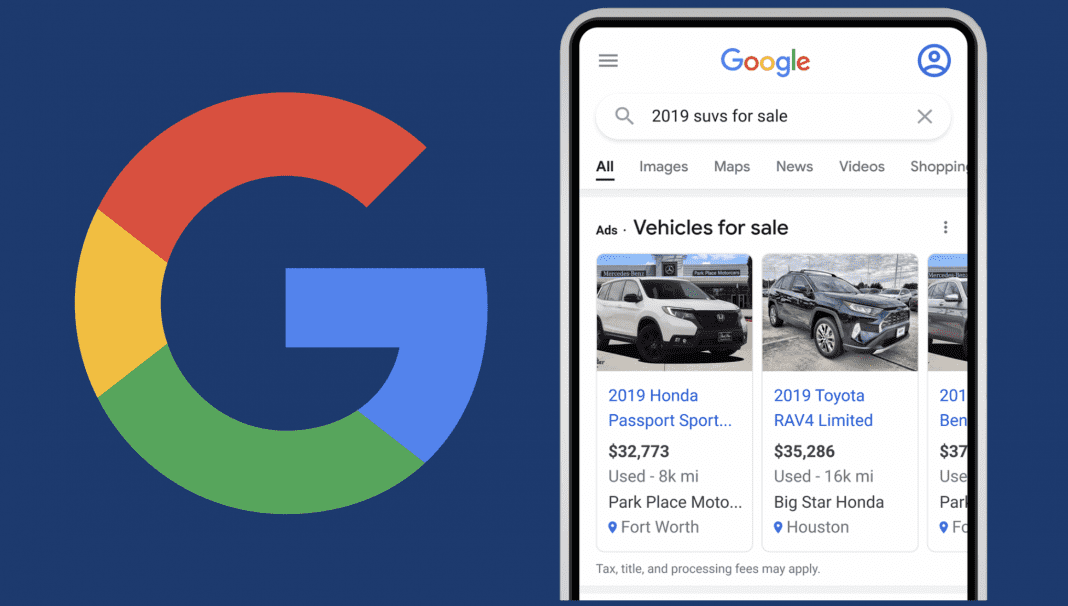There is no doubt that the vast majority of today’s car buyers utilize the Internet when looking for a new vehicle, which may include initial searches and/or follow-up research on specific cars. Online car buying has ramped up significantly since the beginning of the pandemic, with Haig Partners reporting last year that almost 30% of vehicle sales were completed online. The shift to online sales should be taken seriously by dealerships, and they must keep up with digital transitions to both attract new customers and retain current ones.
At the National Automobile Dealers Association Show last week, Google announced that it is launching its new vehicle ads program, which will make it easier for consumers to find cars for sale near them. Google says vehicle ads are “a performance-focused, lower-funnel ad format which allows auto advertisers to promote their entire inventory of vehicles to interested customers shopping for vehicles on Google.” In other words, a Google user searching for a specific car is one click away from an available one at a dealer or retailer nearby.
What does this mean for car dealers?
Google’s vehicle ads are solely available to retailers and dealers, meaning individuals and private sellers are not eligible to use them. Vehicle ads only support non-commercial passenger vehicles, meaning commercial vehicles and recreational vehicles cannot be sold through the program.
After signing up, dealers are instructed to set up Google Smart Shopping campaigns and then provide their available vehicle data to Google’s Merchant Center, which will use specifications to match the vehicles to Google users’ search queries. Vehicle ads also allow dealers to track inventory and performance metrics. The Merchant Center has detailed instructions and guidelines for getting started and using the vehicle ads program.
When a Google user searches for a specific car for sale, vehicle ads will show photos of the available vehicles dealers have provided to the Merchant Center along with specifications like make and model, total mileage, where the car is located, and price. Similar to Google Shopping ads, when consumers click on a vehicle ad, they will be linked out to a dealership’s website and can then contact the dealer directly.
Ultimately, Google says the benefits dealers can receive by using vehicle ads include “more qualified leads,” “omnichannel goals,” “automated targeting,” and “increased exposure.” Using vehicle ads may increase leads and store visits as well as target more relevant customers and provide customers with more information about certain vehicles up front.
Google conducted beta testing on vehicle ads with various companies and found that there was an average of over 25% more conversions when using the technology. Asbury Automotive Group was one business that participated in the testing, and the dealer group found that using Google’s vehicle ads increased conversions by 35% and increased conversion value by 12%. CarMax also took part in the beta testing and reported that Google’s vehicle ads had “driven incremental visits to CarMax’s website and have helped CarMax connect more shoppers with their next car.”
Ken Garff Automotive Group also participated and found that Google’s vehicle ads led to 55% more conversions at nine of its dealerships. The auto group’s Director of Digital Marketing, Nathan Sato, said, “Our main goal is to drive customers to view our inventory. Vehicle ads allow us to get our inventory in front of customers with better efficiency. They also drove more store visits than other campaign types.”
The change in Google’s ad structure for automotive aims for efficiency in targeting car shoppers. How dealers engage with the platform may determine how successful their online ads will be, and it could play into the favor of early adopters.
Did you enjoy this article from Kimberly Hurley? Read other articles on CBT News here. Please share your thoughts, comments, or questions regarding this topic by submitting a letter to the editor here, or connect with us at newsroom@cbtnews.com.
Be sure to follow us on Facebook and Twitter to stay up to date or catch up on all of our podcasts on demand.
While you’re here, don’t forget to subscribe to our email newsletter for all the latest auto industry news from CBT News.










